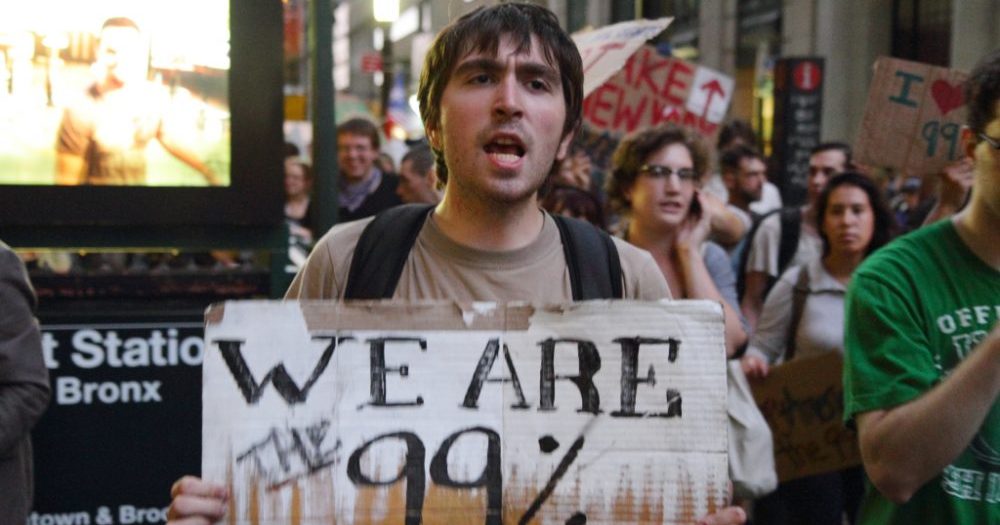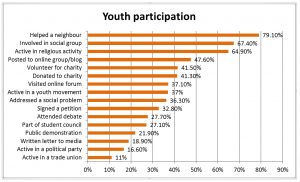Do Young People Engage in Politics?
In this blog, I am going to be talking about how youth engage within politics. This topic is interesting to me because young people are often criticized for not voting and being engaged with politics when in fact they may be engaging in different ways. Some of these ways may include; volunteering, protesting, attending a political debate or campaign. In the general election in 2015 people aged 18-24 had the lowest turnout of voters out of all the age categories with only 43% voting. However, in the 2017 election the turnout of youths voting had increased by 10% showing a rise in youth political engagement. From these results alone we can see a growth in youth engagement within the voting system. In this blog I will identify the ways youths have been engaging with politics.
In 2002, Henn wanted to know what young people thought ‘politics’ is. By surveying 705 people between the age of 18-24 and simply asking ‘what is politics?’ (Fig 1). From the results it is clear that youth do know about politics as most of the responses were relevant. The data suggests that most young people are aware of politics. Which helps us understand that youth are actively engaged in politics but may be unaware of the impact they have when it comes to voting.
There is this idea that young people find politics irrelevant and boring but many youth are engrossed within new politics and do express their opinions on recent debates and news via social media. Social media is a popular way to voice your ideas from the comfort of your own home. It is interactive which makes it attractive for many people as they can chat about a certain topic with people online. Dalton (1996) suggests that young people are not apathetic they are just doing other activities such as ‘alternative politics’ which includes; online politics and consumer politics. This means that they might not be as interested in the main political parties. Similarly, Kimberlee (2002) states how youth may not be interested in the main political parties in Britain because of the ‘New Politics’ agenda which allows young Britons to reject these conventional parties and prioritize new social movements which supports why we see a lot of youth actively protesting.
In the 2015 general election millennials had the lowest turnout (43%) from all the other age categories. This was a big problem as it showed that many millennials did not care about the politics within their own country. Being a youth myself I do often feel disconnected from politics and unaware of how important my individual vote is. However, I still make sure I vote because even if my view is not the most popular I think it is significant for my voice to be heard and by simply expressing my view by voting helps me do this. I think the problem is that we have not been educated in politics and therefore there is a natural detachment from young people and politics. Having said this, it is clear that young people are more active on social media and do take part in protests (fig 2) which does indicate that young people are aware of politics and their effects meaning they do feel strong enough to take direct action against the government.
However, in 2016 we saw countless young people expressing their emotions towards the referendum. Many were shocked and upset with the outcome resulting in leaving the EU. In 2015, one in five of young people had no interest in politics and after the 2017 election this had fallen to one in ten showing a greater interest with youth and engagement within the subject (Cardiff University, 2018). There is also evidence which suggests that after Brexit young adults were more likely to sign petitions and donate to campaigns than older generations which in the past few years before had been different. This shows the power of young people and how they are able unite and make a difference when they feel strong enough about an issue. This also supports the idea of the Youthquake which is the significant social and cultural rise in youth participation.
To conclude, young people are engaging with politics but do underestimate their abilities to make a change. I do feel that young people need to be encouraged to vote as they often don’t realise that their vote is important and will make a difference. Young people do engage politics on social media. Thousands of young people tweeted their views on brexit and the rise of tuition fees on Twitter. I think young people do have a voice but they need the push to go out and make a difference as they are very aware how politics affects society but go about voicing their opinions in subtle ways. Education on politics would also be a good way to teach youths about how different parties and campaigns can affect their lives. If we want to fully acknowledge the ways young people engage we will have to re-evaluate what is classed as political engagement.
Bibliography
Cardiff University. (2018). Has Brexit increased the political engagement of Britain’s youth?. [online] Available at: https://blogs.cardiff.ac.uk/wiserd/2017/06/16/has-brexit-increased-the-political-engagement-of-britains-youth/ [Accessed 16 Feb. 2018].
Dalton, R. (1996) Citizen Politics in Western Democracies. Chatham NJ: Charham House. p20-43
Henn, M., Weinstein, M. and Forrest, S. (2005). Uninterested Youth? Young People’s Attitudes towards Party Politics in Britain. Political Studies, 53(3), pp.556-578.
Ipsos MORI. (2018). How Britain voted in 2015. [online] Available at: https://www.ipsos.com/ipsos-mori/en-uk/how-britain-voted-2015 [Accessed 16 Feb. 2018].
Ipsos MORI. (2018). How Britain voted in the 2017 election. [online] Available at: https://www.ipsos.com/ipsos-mori/en-uk/how-britain-voted-2017-election [Accessed 16 Feb. 2018].
Kimberlee, R. (2002) Why Don’t Young People Vote at General Elections?’, Journal of Youth Studies, 5 (1), p85-97
Media and Citizenship. (2018). Vanessa Malila, Author at Media and Citizenship. [online] Available at: http://mediaandcitizenship.ru.ac.za/author/vmalila/ [Accessed 20 Feb. 2018].






Be the first to comment